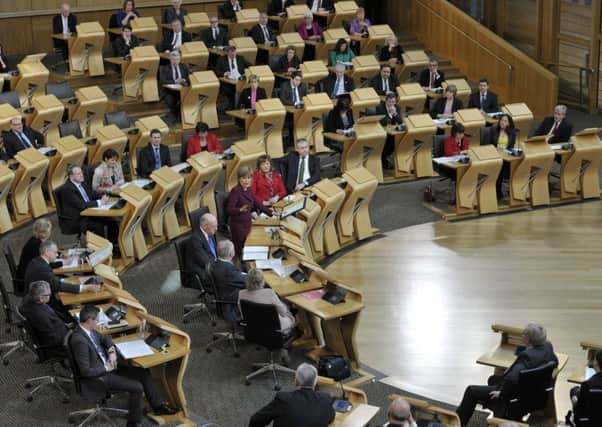Scotland facing '˜unprecedented' £1.3bn public spending cuts


The figures lay bare the scale of the challenge facing finance secretary Derek Mackay as he prepares the first Scottish budget to include new powers over income tax.
Independent think-tank IPPR Scotland warned tax revenues would have to grow by the equivalent of a 3p rise in income tax across the board to fill the looming gap in the public finances.
Advertisement
Hide AdAdvertisement
Hide AdThe figures heap pressure on Mr Mackay to boost economic growth in Scotland, having pledged not to raise tax rates in the first year of the new powers. Legislation giving Holyrood new revenue-raising powers will be put before parliament today.
Scotland’s overall resource budget is set to fall by £800 million per year between 2016-17 and 2019-20, according to IPPR Scotland’s analysis.
Because of commitments to protect certain spending, including the NHS and policing, cuts to other areas, such as local government, are set to be even deeper. Non-protected departments are expected to lose £1.3 billion per year by 2019-20.
IPPR Scotland director Russell Gunson said: “The Autumn Statement leaves a very significant and unprecedented spending squeeze for Scotland’s unprotected departments over coming years.
“The scale of the cuts are close to unprecedented, and we know Brexit may mean cuts in future years too.
“If so, it’s clear that we will need to look closely at significant reform of public services and/or increases in tax revenue in Scotland to ensure we can protect the poorest households in Scotland.”
IPPR Scotland has also calculated the impact on Scotland from Chancellor Philip Hammond’s decision to continue a squeeze on benefits, with cuts amounting to £550m per year in lost income for the poorest households.
Mr Gunson added: “The UK Chancellor did announce some lessening of cuts to Universal Credit that will help people in Scotland.
Advertisement
Hide AdAdvertisement
Hide Ad“However, this small increase is dwarfed by the benefits cuts being undertaken. We find that last week’s announcement will put £50m into the pockets of Universal Credit claimants in Scotland by 2020, but that compares to previous cuts in Scotland that were set to total £600m, leaving families £550m worse off in total.”
Labour – which has called for a 1p increase in tax rates and the creation of a new 50p tax rate for top earners – urged the government to use its new powers to ease the burden on public services.
“The Scottish Parliament should not be a conveyor belt for Tory cuts,” a spokesman said. “SNP ministers have the power to stop the cuts to public services and it’s time they started to use them.”
The Scottish Government will freeze income tax bands rather than raising them in line with the rest of the UK, generating £1bn of additional revenue over five years.
The tax-free personal allowance in Scotland will rise to £12,750 by 2021-22, compared with Mr Hammond’s target of £12,500.
Speaking ahead of the issuing of parliamentary orders giving Holyrood control over £12bn worth of revenues, Mr Mackay said the SNP’s approach on income tax would “suit Scotland’s needs, balancing the need to invest with the recognition that many households are facing difficult economic challenges”.
Scottish Secretary David Mundell claimed the new tax powers would make Holyrood “one of the most powerful devolved parliaments in the world”.
“The Scottish Government will now have unprecedented power to shape the economy of Scotland,” Mr Mundell said.
“It’s now over to the Scottish Government to set out how it plans to use these powers to drive jobs and growth in Scotland.”